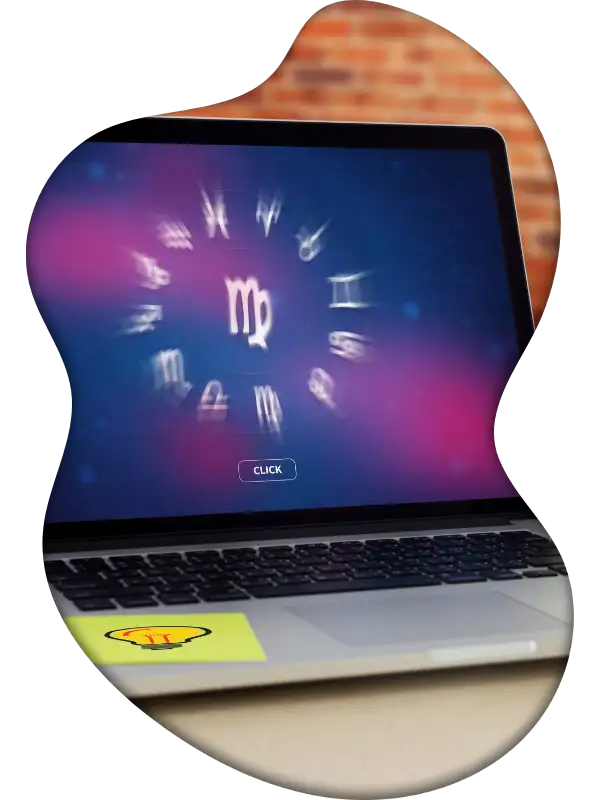Horary astrology is the oldest science of predicting specific life events from the stars. It is famous for high prediction accuracy and fast response.
Horary astrology deals with the horoscope of the situation, sometimes called the horoscope of the question.
Definition. The horoscope of the situation or horary chart is the position of the stars at the moment when the astrologer receives the question from the client. The horoscope of the situation uses the location of the astrologer. The convenience of horary astrology is that the astrologer does not need to know the exact time of the client's birth.
[toc]
Main difference from natal astrology
Horary astrology uses completely different forecasting techniques than natal astrology does. There are three significant differences in predicting future events. Here they are:
High Determinism
Regarding practical results, horary astrology is almost deterministic with a high degree of predictive accuracy. At the same time, natal astrology is more of a probabilistic nature of forecasting.
It is because the context of the situation determines the meaning of the planet in horary astrology. This meaning is unique and unchanged. In natal astrology, planets can take on many definitions simultaneously.
For example, if in a horary chart, Saturn shows a sister, then Saturn no longer has any other meanings. In natal astrology, Saturn can show a sister and, at the same time, the work of a native if it rules the 10th house, and much more.
Looking at the planet Saturn in the natal chart, an astrologer can say that events are more likely to affect the sister and less likely to affect the work of the native.
In horary astrology, everything that happens to Saturn will happen to the sister in the future. And nothing else.
Precise Detail
The second difference between horary and natal astrology is the high accuracy of the forecast. For example, an astrologer can tell where, when, and under what circumstances a person will find a lost thing.
In natal astrology, on the contrary, the focus is on forecasts of significant events - moving, accidents, illnesses, courts and battles, the birth of children, etc., but not on predicting the outcome of a football match or searching for a lost thing - these "ultra-specific" events well predicted by horary astrology.
At the same time, horary astrology is also applicable to significant events. Without limitation, one can use it to predict children's birth, moving, courts, death, marriage, divorce, etc.
Non-Universality
Unlike natal astrology, horary astrology is not always applicable.
- In some cases, there is simply no answer in the horary chart (see the concept of "Radicality" below).
- Also, a horary chart applies only to a specific life situation and does not go beyond the given context of current circumstances.
At the same time, forecasting using the natal chart is possible at any time and on any topic if the exact time and place of birth are known.
Thus, the natal chart is universal and more uncertain with a probabilistic forecasting method. And horary astrology is a less versatile tool, but it has ultra-specific details of the forecast.
Chart Radicality
The situation is predictable when it has already formed and is developing. For example:
- In the question "When will I get married" the situation of loneliness has already formed in the client's life. Therefore, the astrologer can predict when the period of loneliness will end.
- In the question "Where and when will I find the lost ring," the situation has already formed - a person has already lost the ring, and the search is in place. Therefore, we can predict the outcome of this situation.
- In the question "When a meteorite will fall on the Earth," the situation has not yet developed - there is neither cosmic anxiety nor general panic. Therefore, such a question is frivolous. Thus, the horoscope of the question may not contain any answer.
Before starting to analyze a horary chart, an astrologer always looks to see if there is a picture of the future in it. They call this procedure radicality analysis.
Note. One can consider a chart radical if it contains a detailed picture of an existing situation. In this case, you can work with such a map and make an accurate forecast of the development of the situation in the future.
For more information on this technique, see the "Chart Radicality" section.
Planets and Events
The planets act as the main active agents in the horoscope of the question. Usually, they show phenomena, conditions, objects, people, or other living beings.
For example, a planet might show:
- Cousin, thief, doctor (people);
- Pregnancy, illness, wealth (states);
- Profession, company, whether in the city (phenomena);
- Dog, cow, fish (living beings);
- Short trip, long business project (processes);
- Car, book, room in the house (places and objects).
Note. The planets do not show events. No planet is responsible for purchasing, having a baby, or getting a job. But some planets signify the asset, the child, or the work itself.
Any events are "contacts" between moving planets, called aspects.
For example:
- A purchase (event) is a moment of "contact" between the planet showing the person and the planet showing the item being purchased.
- Birth (event) is the moment of "contact" between the planet showing the mother and the planet showing her unborn child.
- An operation (event) is the moment of "contact" between the planet, showing a person and Mars - the natural significator of operations.
The same is true in natal astrology. A planet can bring an event when it comes into contact with a second planet (in primary directions, progressions, or transits)
[promoFreeCourse]


